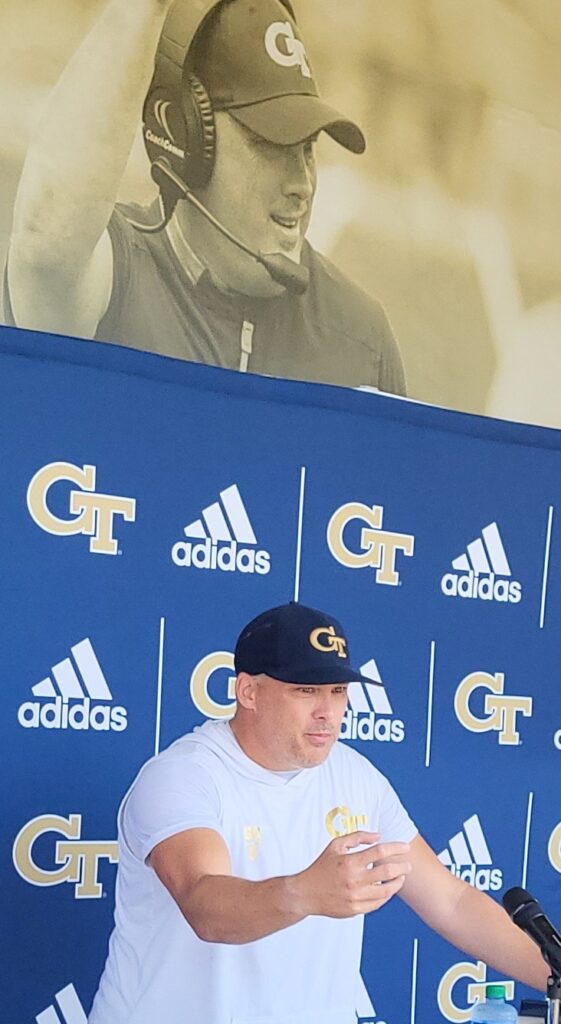No More Waffling: Georgia Tech Cuts Collins Loose
After just a 4 game helping of Geoff Collins’ cooking in 2022, the Waffle House aficionado was informed that he is no longer the cream in Tech’s coffee.

In a move that surprised no one, Georgia Tech officially dismissed Head Football Coach Geoff Collins on Monday September 26. Athletic Director Todd Stansbury was also turned out. It seems only yesterday that we were being warned repeatedly about the enormity of the task that Geoff Collins had taken on as the new coach at Georgia Tech. Actually that was in late 2018. And though Collins said it was the one job he’d always wanted, the new guy from Temple also said his head coaching role at Tech was going to require the greatest transformation in CFB history. He did a thorough job of lowering everybody’s expectations regarding football life at Georgia Tech for the era following the triple option. Accordingly, Tech fans proceeded into 2019 with only guarded hope for a decent season.
That hope was dashed early. After an expected opening loss to Clemson, Tech got past South Florida by a 14-10 score, marking Collins’ first career win at Tech. The next 6 days would mark the only time during Collins’ tenure that he would hold a .500 or better overall mark at the Institute. That’s because on week 3 Tech fell –with a very loud thud– at home to The Citadel by a 27-24 score in what would serve as a harbinger of things to come. Losing to a vastly inferior opponent was bad enough . But there were galling elements to this loss (as there were to many losses that followed). Didn’t The Citadel run the same “antiquated” offense that Tech had just ditched? The one that Tech’s defense had practiced against for 11 years? Yes, but….. And what of that confusion over the wonky usage of timeouts near the end of the Citadel game? Of course, we now know that this timeout issue was not an outlier. It would live and grow throughout Collins’ tenure on the Flats. (Clock management may be one of those things that some people just cannot grasp).
Another thud came a week later in Philly where Tech fell to Temple. This game would serve as the first example of Collins’ curious ability to seemingly accept responsibility for a poor outcome, but in an oddly self-serving fashion. It was almost artful in a way. His lavish praise on the high quality of that day’s opponent served to offer a boomerang of credit to the man who had assembled that “group of great players over in the other locker room” that had just dominated Tech 24-2– namely, Geoff Collins. Yes, it was Collins who had guided Temple to a 15-10 record over the preceding two years. (It was apparently that 2 year record that Collins would use to garner a 7 year contract from now-former Georgia Tech AD Todd Stansbury). And it was about here that Collins began what would become a familiar refrain post-game, by offering great credit to the other team and the other coach. On its face, that sort of comment says good sportsmanship. But with each post-loss repetition, and with no specific regard for the actual quality of the opponent, it began to ring hollow.

The Yellow Jackets did gain wins against Miami and NC State in Collins’ first year, to finish at 3-9, which was not only accepted, but considered almost unavoidable since it was only Year One of the Greatest Transformation. Collins was careful to avoid even an estimation of any general timeframe that Tech would reach the “high level” he often referred to, but he continually assured all that progress was being made toward that day. The evidence he cited was heavy on generalities about the team’s mood and progress made with various Catapult scores. His many installed branding accouterments and habits– the ubiquitous Waffle House cup, the “money down” placards and PA announcements , the above-the-line system instead of a traditional depth chart– all these things were accepted as allowable quirks for the new coach trying to establish a new team culture.
Along this path there were some noteworthy recruiting successes, including a number of 4-stars signees. This was a group not heavily represented during Paul Johnson’s era and so Collins rightfully earned some credit by landing players like Jamious Griffin, Jeff Sims and Jahmyr Gibbs. Notably absent, though, were recruiting gains on highly rated linemen, on both sides of the ball, but especially on offense. In turn, Collins had to depend heavily on the transfer portal to bolster his offensive line. The instability and somewhat chronically erratic O-line play made things a bit hazardous for Jeff Sims among others. Sims’ development proved sporadic in pace and breadth. He showed obvious talent both running and passing, but his throwing accuracy remained variable and he missed series and then entire games with injuries.
2020 began well enough, with a 14-10 road win over FSU. Sloppy, yes, what with 2 blocked kicks yielded by Tech, but a victory nonetheless. But Collins and crew followed up that win with ugly losses to UCF and Syracuse, and two weeks later, they lost to Clemson by a historic 73-7 margin. The Jackets again totaled only 3 wins for the season, foreshortened to 10 games by Covid. Collins’ Year Two did bring 3 conference wins, thus lending a thin veneer of credence to his “progress is being made” refrain.

In yet another odd twist, Collins raised eyebrows with his dismissive post-game handshake with visiting and victorious Pitt Coach Pat Narduzzi at Tech’s final contest in 2020. Collins said later he was trying to hurry to get with his seniors who had just finished their last game for Tech. Noble enough if true, but that answer rang insincere. It was easy to wonder how much time was saved by a handshake that was a shake in name only– a grasp, a sudden lurch to the left, with no eye contact and no speaking. Not a proud moment for the Institute.
As 2021 season approached, Collins made no substantive changes to his staff. There was an air of optimism, what with Covid settling down and with Sims and Gibbs returning to lead the offense. Collins proudly touted the kicking work of Brent Cimaglia, a grad transfer from Tennessee. Collins said he thought Cimaglia would be among the top kickers in America, shoring up an area that had been highly erratic in Collins’ first 2 years at the helm.
All of that optimism vanished with an opening home loss in 2021 to Northern Illinois. Sims had a poor start to his season, completing 4 of 9 passes for 23 yards before departing with a left arm injury. Backup QB Jordan Yates led a comeback to give Tech a 4th quarter lead. But NIU won the game with a last minute drive and a 2 point conversion. New Tech kicker Cimaglia missed 2 field goals in the one-point loss. Again came the post-game accolades from Collins, this time for Northern Illinois, an 18- point underdog.
A few weeks later Collins and his team gained their best win, beating ranked UNC in a nationally televised game at Mercedes Benz Stadium. Collins offered this result as strong evidence of the progress he’d been touting. But one week later, the Jackets wilted at home with a 31 point loss to Pitt. A narrow win at Duke took the Jackets back to 3-3 on the season, but they then lost the final 6 consecutive games, including shutout losses to Notre Dame and Georgia to finish up at 3-10. Despite this turn of events, Collins continued to cite evidence of improvement and even suggested that those who did not see that progress “didn’t want to see it”.
By season’s end, many Tech fans had made a conscious decision to literally “not see it”— there were large patches of empty seats at Bobby Dodd Stadium as UGA demolished Tech 45-0 to end the year. Apathy for the UGA game was a grave sign regarding the mindset of the fanbase.
Soon thereafter, a number of Collins’ best players decided to leave the program. Despite this miserable end to Year Three, AD Todd Stansbury issued an open letter in support of Collins. Stansbury reminded fans that transitions can be slow and he re-avowed his belief in the work of Geoff Collins.
Collins reworked his staff in the post-season. And given the roster losses to the transfer portal , beginning this season 1-3 was not a shock– most prognosticators had Tech pegged to win no more than 3 or 4 games again this year. But again, the highly repetitive pattern of horrific misplays made that 1-3 record seem even worse. This year’s special problem was a sudden inability to protect for punts. To be specific, the Jackets allowed 4 blocked punts in the first 4 games— AFTER Collins had assured everyone that he would be taking a personal role with special teams. This astounding stat was alarming enough to amp up the big donors and the fan base in general. Additional chronic repetitive mistakes included pre-snap penalties for motion or substitution, gaping holes in pass coverage, and strange usage of timeouts that had begun to border on the bizarre (Collins used no first-half timeouts against Clemson, but then used all 3 of his second half timeouts in the first 16 minutes of the second half).
Taken alone, each of those problem areas might be momentarily understandable. College football is still a game of young people doing difficult things with high stakes. Even the best teams are far from perfect. That said, part of the allure to the fans is the fact that practice can bring improvement and thus a collection of lesser talent can achieve superior results by playing well as a team, with determination and intelligence. Tech fans were not sensing those traits as Collins’ time rolled on.
In the end, it truly seemed as though Geoff Collins had a distinctly different notion of “progress” than did the fans and even his boss (or maybe his boss’s boss) Did that 7 year contract give him an idea that the vague progress , the one that others couldn’t see, would be given a few more years to actually produce victories? After all, wins are the yardstick by which most of the football world measures progress. We will likely never know. But when multiple high profile recruits jump off the train in the middle of their college careers, it is a pretty good sign that something is seriously amiss. Collins’ vision for Tech football was that he could and would make better use of the hotbed recruiting area that surrounds Atlanta. But for that plan to bear any fruit, the hotshots have to hang around. Many chose not to hang around. Telling.
And so Collins at GT is done. He takes with him a nice 8 figure buyout number. Tech definitely overpaid. Perhaps the discontinuation of all the trappings of the Collins era– the money down signs, the 404 and ATL logos on the field, etc. will save some money going forward. Either way, Georgia Tech as an institution has to decide at what level they wish to compete in the ever-crazier world of college football. If Tech cannot find a secure path for bringing in good talent (which Collins did to some degree) and in developing and optimizing that talent (which Collins did not do), then there is little use in playing the game at the big boy level. Georgia Tech President Cabrera has said he wants Tech’s athletic teams to perform on par with the school’s academic work. That’s a very high standard. And that sounds good to Tech football fans. They are ready for actual progress. The kind anyone can see. The kind that’s quantified by more wins. Seems reasonable.
Patrick Conarro
RamblinSports.com
F
